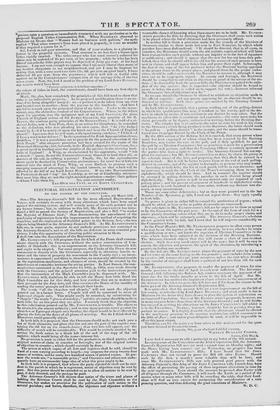THE NEW TITHE BILL.
TO TUE EDITOR OF THE SPECTATOR. TO TUE EDITOR OF THE SPECTATOR.
236 February 1836.
SIR—I request your insertion of this letter, at your perfect convenience, upon the three following grounds : firstly, because I have subscribed to your paper from its commencement, and this I consider to be a claim upon your. courtesy ; secondly, because I am a Whig, and this I consider to be a quasi claim upon a Radical like yourself; and thirdly, because, from my hour of or- dination until now, I have never interfered in politics—a great merit in a cler- gyman of the present day—and therefore I may be pardoned if I obtrude my
bpinitms upon a question so immediately crinnected with my profession as is the proposed English Tithes Commutation Bill. When NAPOLEON observed to Madame ne STALL that "Women had no business with politics," she aptly replied "That when women's lives were placed in jeopardy, it were no wonder
if they required a reason for it.". Sir, I wish to call your attention, and that of your readers, to a glaring in- justice in the proposed measure. That measure is no less than a bonus.upon tithes rigidly exacted. The tithe-owner who has most severe'y enforced his claim may be mulcted of 25.per cent. of his property ; while he who has been liberal towards-the tithe-payers may he deprived of forty per cent, of his legal income. I am not vain enough to suppose that I am more liberal than many of my brother clergymen in my neighbourhood, and yet I may he forgiven fur stating that, with a very moderate tithe (us. ad. per acre on good land), I have deducted 10 per cent, from the paymenis ; which will tell as fearful odds against me in the Commissioners' computstion of the average tithe of the lest seven years. Now, Sir, had I stood in the position of my Lord JOHN RUSSELL, ray maxim wonkl have been
" Parcere subject is et debellare snperbos
the takers of tithes in kind, the extortionate, should have been my first objects a attack.
Mark, Sir, also, how completely the principles of this bill tend to show that
tithe is an indissoluble property. In its propesed mollification there is no no- tion of its being altogether merged : no—a portion is to be taken from one class and handed over to another—front the paisous to the landlords. And here I am led to remark upon the principal object of my letter. I !der to the incon- sistent, nay, the shameless conduct of the Conservatives. Where, in the debate upon the question, was the indignant zeal of my Lord STANLEY, the pious Church of England ardour of Sir JAMES GHANA M, the sanctity of Sir R. 'Nests, the cautious party principles of Sir ROBERT PEEL ? It is told of a ci- decant Judge, now a Tory Peer, that, in an action for blimpliemy, he remarked to the defendant, who was pleading his own cause, that " he (the Judge) would be d—d if he would sit upon the bench and hear the Church of England
abused !" I presume that he will now, with equal energy, exclaim, " be
if I say a word in her defence !" In the question of the h ish Appropriation clause, doubtless, " it was a scandalous act to provide for the general education of the Irish People" after adequate provision had been secured for the wants of the Protestant Hierarchy; but, forsooth, in the Eng/ish Amoropriotios clause, theis is great merit in handing over the surplus of the liaisons to the starring land- lords of England ! A Whig, as characterized by his opponents, wuuld " rob a church!" query, do not the Conservatives seem disposed to lend their aid, as masters of the soil, in robbing a parson? Finally, Sir, let the agriculturists never again be deceived by Censer vative protestations; for never has it hitherto entered into the mind of Tory, Whig, or even Radical, to propose such a sweeping measure of advantage to the landed interest, as that which will be afflusled by the bill of my Lord JOHN RUSSELL. If my two Representatives in Parliament do not " cap" his Lordship, as we say at Cambridge, whenever they meet him, they.ara not the right-minded gentlernen—malgve their politics
THE GOTTI PER CENT, OF AN ESSEX CLERGYMAN.



























 Previous page
Previous page